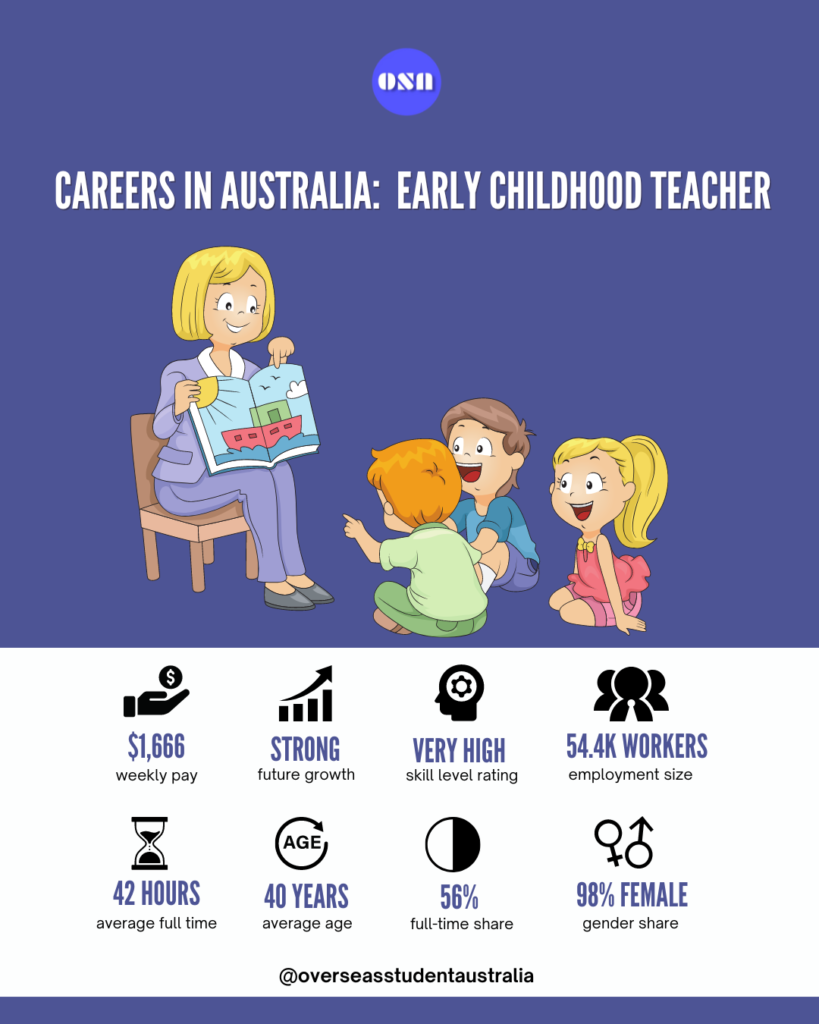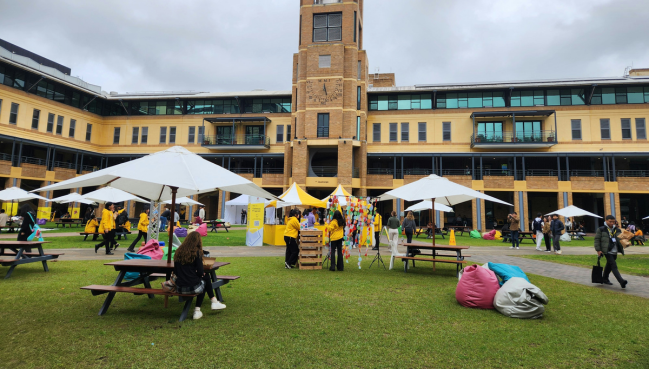How to become an Early Childhood Teacher in Australia with Salary Guide

Do you have a strong passion for teaching?
Does impacting knowledge on younger children interest you?
If you do, then being an Early childhood teacher might be where your dream career lies.
Early childhood teachers are educators who teach basic knowledge such as numeracy, literacy, art, and literature to young children as well as promote their learning abilities, and emotional, physical and psychological development.
Early childhood educators support young children’s social and academic development and are also accountable for relating to them both individually and in groups.
The job opportunities for these professionals are extremely varied and broad, ranging from working in government childcare facilities to pre-primary schools.
In this blog post, we will discuss all you need to know about how to become an Early childhood teacher in Australia.
Overview of Early Childhood Teaching in Australia
Early childhood teaching is a very important aspect of society, this is because these teachers potentially raise the future of tomorrow. They work with young children not only in groups but individually as well.
They are solely responsible for inculcating basic elementary knowledge and skills needed in life.
There are about 54,000 Early Childhood Teachers employed in Australia now and data from the Australian government shows that there will be a massive-projected growth of this career in years to come.
Size of the industry
Over 54,000 early childhood teachers are employed in the Australian workforce currently.
Statistics show an enormous projected growth of 21.6% by 2026, making this profession a promising career path.
Popular Locations
A whopping 63% of Early Childhood teachers live in the capital cities, this is like the all-job average of 62%.
New South Wales has a large share of employment compared to its size.
Here below is a percentage of Early childhood teachers living in Australia by state and Territory;
- New South Wales 35.2%
- Victoria 24.1%
- Queensland 16.5%
- Southern Australia 8.7%
- Tasmania 2.0%
- Western Australia 10.8%
- Australian Capital Territory 1.8%
- Northern Territory 0.9%
Industries where Early Childhood Teachers are needed
A massive 60.1% are employed in the Education and training industry, they have the largest share of employment rate for these professionals.
Other industries account for the remaining 39.9% of the early childhood teachers population; these industries include:
- Healthcare and social assistance. 38.1%
- Arts and Recreational services 1.2%
- Manufacturing 0.4%
- Other industries 0.2%
Hours of work
In Australia, about 56% of early childhood teachers work full-time hours in all their jobs. Full-time workers work an average of 42 hours a week, which is like the all-jobs average of 44 hours a week.
More than a third of these professionals work full-time either paid or unpaid.
Age
The average age for early childhood teachers is 40 years; this is the same as all jobs average age (40 years).
A large share of workers are within the age bracket of 25 to 34 years.
Gender
With more than 54,000 Early childhood teachers employed in Australia, women account for 98% of the workforce, which is 50% above the all-jobs average for women (48%) and men account for the remaining 2% of the workforce.
What are the skills required to be an Early Childhood Teacher in Australia?
Here below are some skills required to become an Early childhood teacher in Australia:
- Time management.
- Speaking.
- Writing.
- Active persuasion.
- Active learning.
- Social perceptiveness.
- Active Listening.
- Coordinating with others.
- Judgment and decision-making.
- Complex problem-solving.
- Learning strategies.
- Negotiation.
What are the tasks and duties of an Early Childhood Teacher in Australia?
Here below are some tasks and duties to be performed by an Early Childhood teacher:
- Educate students by planning and preparing different learning activities
- Observe and keep records of children’s learning
- Encourage student participation and engagement
- Discussing child’s learning and development with parents
- Working along with various other professionals to support child’s growth
How much does an Early childhood teacher earn in Australia?
The earnings of early childhood teachers depend on their qualifications and years of experience.
On average, the average earnings for an early childhood teacher is $1,666 per week, which is higher than all jobs average pay of $1,593 per week.
The average hourly pay is $46, which is higher than all jobs hourly pay of $41.

Essential Steps in becoming an Early childhood teacher in Australia
Here is a step-by-step procedure on how to become an Early childhood teacher in Australia:
Step 1: Getting a degree in early childhood education.
You must have a bachelor’s degree in early childhood education from an accredited university to work as an early childhood teacher in Australia.
If you have got a degree in Early childhood education from a University, then you can also pursue postgraduate study in the same field.
– Bachelor of Early Childhood Education
You must have finished high school and taken the courses required by your chosen institution to enroll in an undergraduate program in early childhood education at a recognised Australian university.
Before applying to study early childhood education in Australia, applicants must fulfill several standards set forth by the majority of universities in the country.
These conditions may include:
•Must have completed Grade 12 or above.
•An English proficiency exam with the band score required by the target university (IELTS, TOEFL, PTE). (Students from non-English-speaking nations should use this.)
•At least 17 years old.
If you satisfy all the requirements, you could be permitted to enroll in a recognised institution to study early childhood education.
A full-time study for a Bachelor’s degree in Early Childhood Education takes 4 years.
In Australia, a Bachelor’s degree in Early childhood education typically costs roughly AUD 26,000 per year to pursue.
Some students also take an alternative pathway of completing a Diploma in Early Childhood Education and then complete a Bachelor degree in Early Childhood Education. This helps students to get credits for their Bachelor degree, and they can complete the Bachelor degree in shorter time frames.
Important Note: International students who are planning to become Early Childhood Teachers in Australia, must demonstrate high English Language skills by undertaking an IELTS test (with a minimum score of 7.0 in Reading and Writing and 8.0 in Speaking and Listening).
Exemption from English Test: You are exempt from an English Test as an international student if you have already completed 4 years of higher education (university) in Australia, Canada, Ireland, New Zealand, UK or USA.
– Masters of Teaching (Early Childhood)
After earning a bachelor’s degree in Early childhood education or a closely related field, you can pursue a master’s degree in early childhood.
The duration of full-time study for a master’s degree in early childhood education is 2 years.
Some prerequisites must also be satisfied if you wish to apply for an Early childhood education master’s degree in Australia.
• An undergraduate degree
• An English proficiency exam with a band score that the target university accepts (IELTS, TOEFL, etc.).
• Two years of work experience (Not mandatory but recommended).
In Australia, a Master’s degree typically costs roughly AUD 32,000 per year
Read more about essential entry requirements of studying a degree in Australia here.
Step 2: Obtain a certificate in first aid and working with children check
In Australia, you must have a recognised First Aid certificate, an Asthma Management Certificate, and knowledge of anaphylaxis to teach young children.
You might also be required to get a Working with Children Check before commencing to work in field with young children.
Step 3: Get registered
The next step is to submit paperwork to the Department of Education to get registered in your state, or territory after getting a degree or certificate in early childhood education.
Step 4: Apply for jobs
Once you’ve finished the previous procedures, you may go on to apply for employment in your area, pre-primary schools, close by hospitals and clinics for childcare, government and state institutions, and schools.
Step 5: Become a member of an Australian Teaching Association body
Additionally, you may want to consider becoming a member of one of Australia’s teaching bodies.
There are many educational organisations in Australia, here are a few to highlight:
- Early Childhood Teachers Association
- Australian Teacher Education Association
- Teachers Registration board Tasmania
- Teachers Registration Board South Australia
- Australian Children’s Education and Care Quality Authority
- Queensland College of Teachers
- ACT Teacher Quality institute
An annual fee that ranges from $0 – $100 is required to join these associations.
What are the popular universities to study Early childhood education in Australia?
Here is a list of popular universities to study Early Childhood courses in Australia:
- James Cook University
- University of Sydney
- Edith Cowan University
- University of Melbourne
- South Australian University
- Swinburne University
- Deakin University
Future growth of Early childhood teaching in Australia
As education is necessary to learn and acquire fundamental life skills and knowledge, early childhood education is a vital part of society. It is the responsibility of early childhood teachers to instill these skills and knowledge in young children.
Early Childhood teaching career is expected to grow significantly by 21.6% through 2026, making this career path reliable and solid.
It takes a strong desire and passion to advance knowledge and develop tomorrow’s leaders to become an early childhood educator.
This concludes our guide on how to become an early childhood teacher. Please let us know which profession you would like us to cover next in the comments section below.


